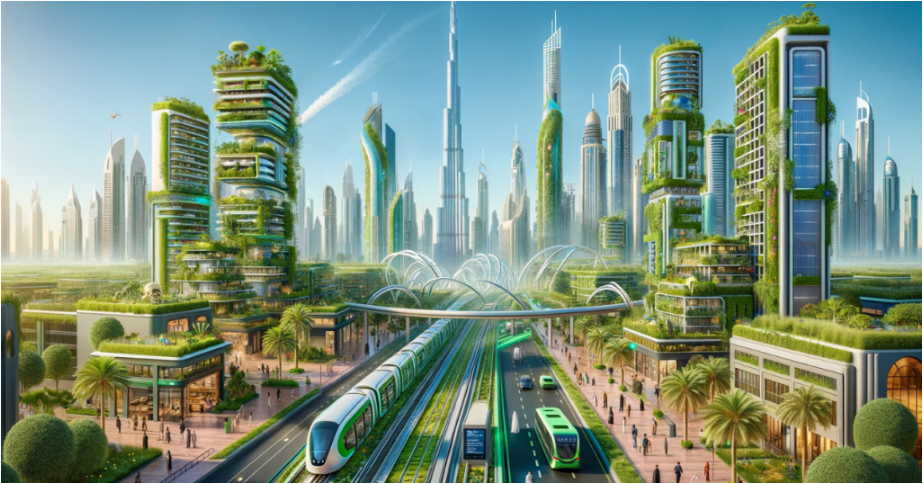Palm Jebel Ali is poised to become one of Dubai’s most iconic destinations, but its vision extends beyond luxury living and world-class attractions. As part of Dubai’s broader goal to promote sustainability and eco-friendly development, Palm Jebel Ali incorporates several green initiatives to minimize its environmental impact while offering an innovative and sustainable lifestyle. The integration of eco-conscious designs, renewable energy sources, and sustainable practices make Palm Jebel Ali a forward-thinking model for urban development in the UAE.
In this article, we’ll explore the various aspects of sustainable development on Palm Jebel Ali and highlight the green initiatives that are making this man-made island a beacon for eco-friendly living.
1. Renewable Energy and Energy-Efficient Designs
One of the core aspects of sustainable development on Palm Jebel Ali is the emphasis on renewable energy and energy-efficient design. The island’s infrastructure and residential properties are designed with energy conservation in mind, utilizing innovative technologies to reduce carbon footprints.
Solar power plays a key role in the island’s energy strategy. Many buildings and homes on Palm Jebel Ali are expected to incorporate solar panels, harnessing the abundant sunlight to generate clean energy. This reduces reliance on fossil fuels and helps residents lower their electricity costs while contributing to Dubai’s ambitious renewable energy targets. By leveraging renewable sources, Palm Jebel Ali aligns with the UAE’s vision for a more sustainable future.
Additionally, energy-efficient appliances, smart home technologies, and sustainable building materials are integrated into the design of luxury homes, hotels, and commercial spaces on the island. These energy-efficient systems not only help conserve power but also enhance the overall quality of living by providing smart temperature control, lighting, and ventilation systems that optimize energy usage.
2. Sustainable Building Materials and Construction Practices
The construction of Palm Jebel Ali is focused on minimizing environmental damage by utilizing sustainable building materials and eco-friendly construction practices. Developers are prioritizing materials that have a lower environmental impact, such as recycled steel, bamboo, and energy-efficient glass. These materials not only reduce waste but also contribute to the long-term sustainability of the structures built on the island.
In addition to using sustainable materials, the construction processes on Palm Jebel Ali follow green building standards, which promote the use of less water, lower emissions, and reduced waste during the construction phase. Waste reduction measures, such as recycling construction materials and minimizing landfill contributions, are a central part of the project’s sustainability goals. This ensures that the environmental impact of building a large-scale man-made island is minimized while still creating a world-class destination.
3. Water Conservation and Efficient Use of Resources
Water scarcity is a significant challenge in the UAE, and Palm Jebel Ali has taken steps to address this by implementing water conservation measures throughout the island. These initiatives range from the use of water-efficient technologies in residential and commercial spaces to the treatment and recycling of wastewater for irrigation.
For instance, homes and public areas on Palm Jebel Ali will feature water-saving fixtures such as low-flow faucets, showers, and toilets that reduce water consumption without compromising comfort. Additionally, the landscaping on the island is designed with drought-resistant plants and greenery that require minimal water. Native plants that are better suited to the UAE’s arid climate are used to ensure that water resources are used efficiently.
Irrigation systems on Palm Jebel Ali are designed with smart technologies that monitor soil moisture levels and ensure that water is used only when necessary. These systems also prioritize the use of treated wastewater, reducing the demand for freshwater. By incorporating these water-saving techniques, Palm Jebel Ali plays a role in addressing water scarcity while maintaining lush green spaces and beautifully landscaped areas.
4. Eco-Friendly Transportation and Reduced Emissions
Sustainable transportation options are a key component of Palm Jebel Ali’s green initiatives. The island’s layout is designed to encourage walking, cycling, and the use of electric vehicles, reducing the reliance on traditional fossil-fuel-powered transportation. Dedicated walking and cycling paths will connect different parts of the island, encouraging residents and visitors to adopt more eco-friendly modes of transportation.
Moreover, Palm Jebel Ali will feature electric vehicle (EV) charging stations in strategic locations across the island, making it easier for residents and tourists to switch to electric cars. These EV stations are part of Dubai’s broader initiative to reduce carbon emissions and promote the use of clean energy in transportation. Public transportation on the island is also expected to include electric buses and other low-emission vehicles that contribute to a cleaner environment.
This focus on sustainable mobility not only helps reduce greenhouse gas emissions but also enhances the overall quality of life by creating a cleaner, quieter, and more environmentally friendly urban environment.
5. Green Spaces and Biodiversity Preservation
Palm Jebel Ali is designed to integrate green spaces into its urban landscape, promoting a connection between nature and urban living. Parks, gardens, and recreational areas are central to the design of the island, offering residents and visitors places to relax, exercise, and enjoy the outdoors.
In addition to providing green spaces for human use, Palm Jebel Ali also focuses on preserving and enhancing biodiversity. The island’s developers have made efforts to protect the marine life surrounding the island by implementing sustainable construction practices that reduce damage to the surrounding waters. Coral reefs and marine ecosystems in the area are protected and maintained, and artificial reefs are being introduced to support the local marine life.
Moreover, landscaping on the island will incorporate native plant species that contribute to the local ecosystem while minimizing water and maintenance requirements. These green initiatives aim to create a balanced and eco-friendly environment that supports both human well-being and biodiversity conservation.
6. Waste Management and Recycling
Effective waste management is a crucial part of sustainable development, and Palm Jebel Ali is committed to implementing comprehensive waste reduction and recycling programs. The island will feature modern waste disposal systems that prioritize recycling and the reduction of landfill waste. Residents and businesses will have access to recycling facilities that separate waste materials such as plastic, glass, metal, and paper for processing and reuse.
To further promote eco-friendly waste management, Palm Jebel Ali will incorporate waste-to-energy technology, which converts organic waste into energy that can be used to power buildings and facilities. This not only helps reduce the island’s reliance on traditional energy sources but also minimizes the environmental impact of waste disposal.
7. Commitment to Dubai’s Vision 2040
The development of Palm Jebel Ali is closely aligned with Dubai’s Vision 2040, which outlines a sustainable future for the city that prioritizes green urban planning, environmental conservation, and renewable energy. By incorporating sustainable building practices, eco-friendly transportation options, and energy-efficient technologies, Palm Jebel Ali contributes to Dubai’s broader goals of reducing carbon emissions and creating a more sustainable city for future generations.
Palm Jebel Ali is set to become a model for sustainable living, offering a luxurious lifestyle without compromising the environment. As part of Dubai’s vision for the future, the island’s green initiatives represent a step forward in creating eco-friendly communities that promote sustainability while delivering the highest quality of living.
Conclusion
Palm Jebel Ali is not just a luxurious waterfront development; it’s a forward-thinking project that emphasizes sustainability and environmental responsibility. With its renewable energy solutions, water conservation efforts, green transportation options, and commitment to preserving biodiversity, Palm Jebel Ali sets a new standard for eco-friendly living in Dubai. By combining luxury with sustainability, Palm Jebel Ali is poised to be a landmark development that leads the way toward a greener, more sustainable future.

